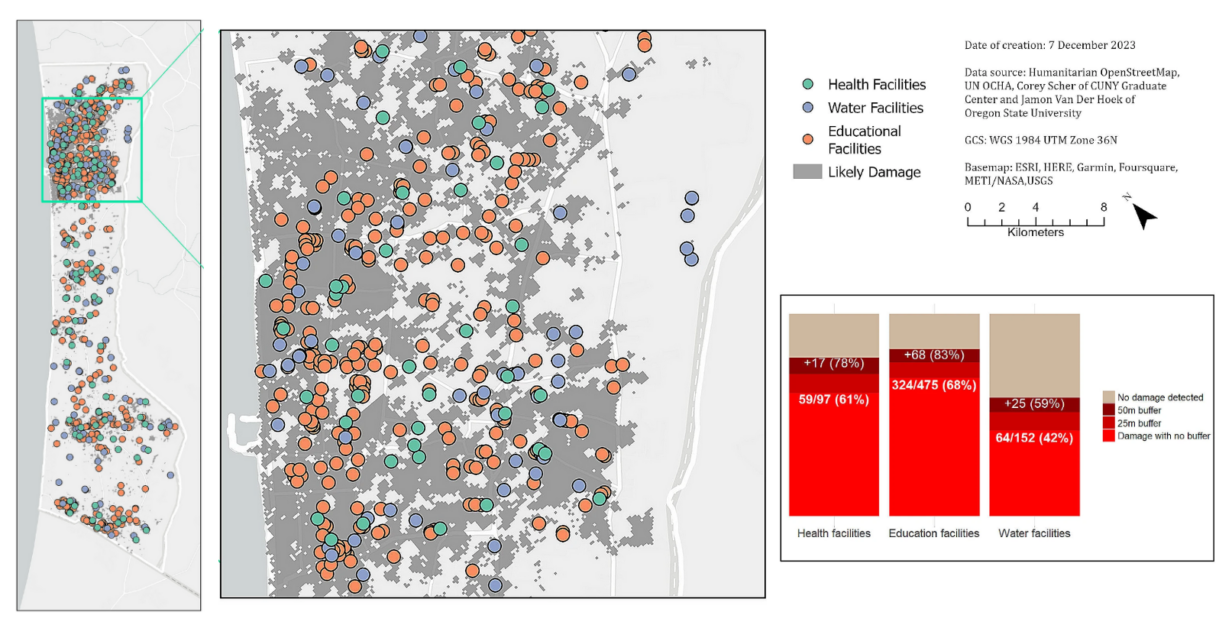BOSTON, MA – A new study reveals that more than half of healthcare, education, and water facilities were damaged by Israeli attacks between October 7th and November 22nd, 2023, across all five governorates in the Gaza Strip, according to researchers at Harvard University and their collaborators.
Using high-resolution satellite radar imagery to evaluate damage and open-source data maps to identify health, education, and water facilities, the authors used spatial analysis to overlap the damage affecting health, education and water facilities throughout the Gaza Strip during the study period.
“Our data shows that health, education, and water facilities in Gaza were not damaged in a random pattern, but rather that damage was highly clustered on these facilities,” said Yara M. Asi, PhD, Assistant Professor at the University of Central Florida and lead author of the study.
While damage was more extensive and concentrated in the northern Gaza Strip governorates, satellite analysis demonstrated significant destruction to civilian infrastructure in the southern governorates, where approximately half of the Gaza Strip population was ordered to flee on 12 October 2023. Damage was also noted along the demarcated civilian evacuation corridor of Salah Al-Din Street.
“This new article reveals with hard data the pattern that we have seen with our eyes over the past six months, that Israel has intentionally decimated civilian infrastructure in its attack on Gaza,” said Dr. Raz Segal, Associate Professor of Holocaust and Genocide Studies at Stockton University. “The specific targeting of hospitals and the bombing of routes and areas designated as safe by the Israeli army,…together with statements from Israeli leaders that they are ‘rolling out Nakba 2024’ and that ‘Gaza will never go back to what it was,’ lends additional credence to the provisional ruling of the International Court of Justice (ICJ) on 26 January 2024 that Israel is plausibly perpetrating genocide in its attack on Gaza.”
While these results support prior reports, this new study provides additional evidence for the determination of war crimes and other violations of international law. It shows that, rather than being dispersed or randomly allocated at civilian infrastructure locations, damage was clustered around these infrastructures. Authors estimate a less than 1% chance that such clustering could have happened by random chance, bringing to light questions of intentionality and potential concerns for violations of international humanitarian law.
“I appreciate the careful analysis of these academics to build the evidence base for understanding what’s happening. The current accelerated Israeli assault on Gaza continues a fifteen-year project to erase Palestinians from their territories. Undermining the civilian life-sustaining infrastructure required to keep a population healthy is a shameful crime without justification,” said Amy Hagopian, Professor Emeritus at the University of Washington. “Building infrastructure to deliver education, water and health care takes time, resources and commitment, and yet these accomplishments can be wiped out in a heartbeat. Rebuilding will take decades.”
The article, titled “Nowhere and no one is safe’: spatial analysis of damage to critical civilian infrastructure in the Gaza Strip during the first phase of the Israeli military campaign, 7 October to 22 November 2023” was published in the open access journal Conflict and Health and is available in full here.
*******************
The Palestine Program for Health and Human Rights is a collaboration between the FXB Center for Health and Human Rights at Harvard University and the Institute of Community and Public Health at Birzeit University, engaging in the study of Palestinian health through knowledge production, education, and multidisciplinary community engagement.
The François-Xavier Bagnoud Center for Health and Human Rights (FXB Center) was founded and endowed by Albina du Boisrouvray in 1993. Her goal was to provide protection to children by furthering the vision for health and human rights of first director Jonathan Mann, and it received the enthusiastic collaboration of then-Dean Harvey Fineberg. We use interdisciplinary approaches to promote equity and dignity for those oppressed by racism, poverty, and stigma, nationally and around the world. We are proud to partner with a diverse group of scholars, educators, elected officials, government agencies, nonprofit organizations, and members of the international policy community to advance health and human rights, and to show the harmful effects of violations on children. To learn more, please visit fxb.harvard.edu.
Press Contact: Yara M. Asi, yasi@hsph.harvard.edu

